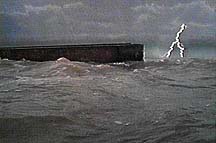Easter
From Wikipedia, the free encyclopedia
Jump to:
navigation,
search
<!-- start content --> This article is about the
Christian religious festival. For other uses, see
Easter (disambiguation).
<table class="infobox" style="width: 22em; text-align: left; font-size: 88%; line-height: 1.5em;" cellspacing="5"> <tbody><tr> <td colspan="2" class="" style="background: Lavender none repeat scroll 0% 50%; text-align: center; font-size: 125%; font-weight: bold; -moz-background-clip: -moz-initial; -moz-background-origin: -moz-initial; -moz-background-inline-policy: -moz-initial;">Easter</td> </tr> <tr> <td colspan="2" class="" style="text-align: center;">
 16th century Russian Orthodox
16th century Russian Orthodox icon of the Descent into The Hades of
Jesus Christ, which is the usual Orthodox icon for Pascha.</td> </tr> <tr> <th style="">Observed by</th> <td class="" style="">Most
Christians</td> </tr> <tr> <th style="">Type</th> <td class="" style="">Christian</td> </tr> <tr> <th style="">Significance</th> <td class="" style="">Celebrates the resurrection of
Jesus</td> </tr> <tr> <th style="">Date</th> <td class="" style="">First Sunday after the first full moon on or after
March 21</td> </tr> <tr> <th style="">2007 date</th> <td class="" style="">
April 8 (both
Western and
Eastern)</td> </tr> <tr> <th style="">2008 date</th> <td class="" style="">
March 23 (
Western)
April 27 (
Eastern)</td> </tr> <tr> <th style="">2009 date</th> <td class="" style="">
April 12 (
Western)
April 19 (
Eastern)</td> </tr> <tr> <th style="">Celebrations</th> <td class="" style="">Religious (church) services, festive family meals,
Easter egg hunts, and gift-giving (latter two, especially in
USA and
Canada)</td> </tr> <tr> <th style="">Observances</th> <td class="" style="">
Prayer, all-night vigil (almost exclusively Eastern traditions), sunrise service (especially American Protestant traditions)</td> </tr> <tr> <th style="">Related to</th> <td class="" style="">
Passover, of which it is regarded the Christian equivalent;
Septuagesima,
Sexagesima,
Quinquagesima,
Shrove Tuesday,
Ash Wednesday,
Lent,
Palm Sunday,
Maundy Thursday,
Good Friday, and
Holy Saturday which lead up to Easter; and
Ascension,
Pentecost,
Trinity Sunday, and
Corpus Christi which follow it.</td> </tr> </tbody></table> <table style="background: rgb(249, 249, 249) none repeat scroll 0% 50%; -moz-background-clip: -moz-initial; -moz-background-origin: -moz-initial; -moz-background-inline-policy: -moz-initial; font-size: 85%; line-height: 110%;"> <tbody><tr> <td>

</td> <td style="padding: 0pt 0.2em;">
Christianity portal</td> </tr> </tbody></table>


"Eástre" by Jacques Reich.
Easter (
Greek: Πάσχα,
Pascha or Pasxa) is the most important religious feast in the
Christian liturgical year.<sup id="cite_ref-0" class="reference">
[1]</sup> Christians celebrate this day in observance of their belief that
Jesus Christ rose from the dead two days after his
crucifixion (Easter Sunday, commonly referred to as the "third day" including the day of crucifixion), now estimated to have taken place between the years
AD 26 and AD 36. Many non-religious cultural elements have become part of the holiday, and those aspects are often celebrated by many Christians and non-Christians alike.
Easter also refers to the
season of the church year called
Eastertide or the
Easter Season. Traditionally the Easter Season lasted for the forty days from Easter Day until
Ascension Day but now officially lasts for the fifty days until
Pentecost. The first week of the Easter Season is known as Easter Week or the
Octave of Easter. Easter also marks the end of
Lent, a season of prayer and penance.
Easter is termed a
moveable feast because it is not fixed in relation to the
civil calendar. Easter falls at some point between late March and late April each year (early April to early May in
Eastern Christianity), following the cycle of the moon. After several centuries of disagreement, all churches accepted the computation of the Alexandrian Church (now the
Coptic Church) that Easter is the first Sunday after the first fourteenth day of the moon (the
Paschal Full Moon) that is on or after the ecclesiastical vernal
equinox.
Easter is linked to the Jewish
Passover not only for much of its symbolism but also for its position in the calendar. The
Last Supper shared by Jesus and his
disciples before his crucifixion is generally thought of as a Passover meal, based on the chronology in the
Gospels.<sup id="cite_ref-1" class="reference">
[2]</sup> Some, however, interpreting "Passover" in
John 19:14 as a single meal and not an eight-day festival,<sup id="cite_ref-2" class="reference">
[3]</sup> interpret the
Gospel of John as differing from the
Synoptic Gospels by placing Christ's death at the time of the slaughter of the Passover lamb, which would put the Last Supper slightly before Passover, on
14 Nisan of the Bible's
Hebrew calendar.<sup id="cite_ref-Leviticus_3-0" class="reference">
[4]</sup> According to the
Catholic Encyclopedia, "In fact, the Jewish feast was taken over into the Christian Easter celebration."












